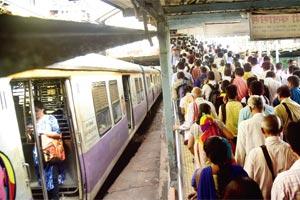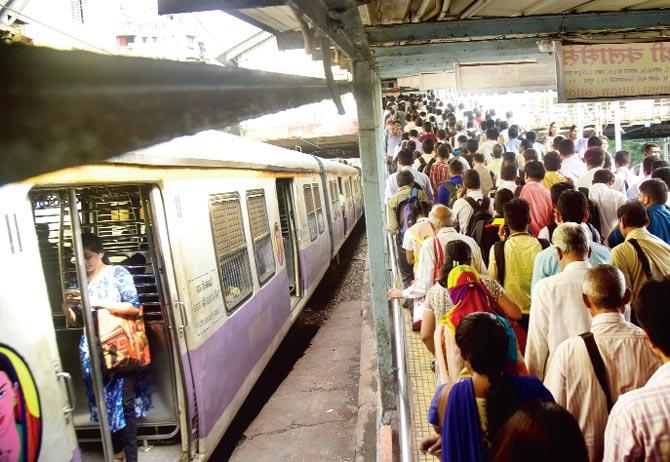The Bombay I grew up in was home to people who cared, not just about the city, but about those around them. Where have all those people gone?


It's easy to erase much of what is negative about one's youth because looking back from a distance makes the past seem a lot more glorious than it was while we were living it. File pic
ADVERTISEMENT
 The Bombay Police feature quite often in many fond memories of my early life in Bombay. This isn't because I have a criminal bent of mind, but because my encounters (now an unfortunate word) with them always ended in smiles. I remember sitting in an abandoned vehicle with friends from college, for instance, and being surprised by a plainclothes cop who decided to find out what we were doing there. After he was assured that we weren't planning a crime, he informed us that the spot we were in was actually close to where someone had been murdered a few days before. He then spent the next half hour with us, sharing our snacks and advising us on how to live better lives.
The Bombay Police feature quite often in many fond memories of my early life in Bombay. This isn't because I have a criminal bent of mind, but because my encounters (now an unfortunate word) with them always ended in smiles. I remember sitting in an abandoned vehicle with friends from college, for instance, and being surprised by a plainclothes cop who decided to find out what we were doing there. After he was assured that we weren't planning a crime, he informed us that the spot we were in was actually close to where someone had been murdered a few days before. He then spent the next half hour with us, sharing our snacks and advising us on how to live better lives.
Cops once stopped me and two other friends for riding on the same bicycle, then offered to drop one of us home to make the commute safer for the other two. And, a convoy of policemen once helped me look for my shorts on a beach near Madh Island at 1 am, because I had left them on the rocks to go for a midnight swim with a few other people.
I think of those policemen fondly, decades after they made an appearance in my life, because they represent so much of what made Bombay special. Nostalgia does have a way of sifting out the bad, of course, but I refuse to see anything in common between those officers and the ones who now occupy chairs at any of our local police stations. Back then, I wouldn't think twice about walking up to a policeman. I doubt any student would feel as comfortable doing that today.
It wasn't just government employees either; it seems to me as if we were surrounded by nicer people at the time, not angry commuters rushing to and from work with murder on their minds. There were rare fights on the local train when I travelled to college, and older commuters went out of their way to offer me seats when they saw me with my books. I compare those trips to ones I take today, with a million people jostling for elbow room, ignoring the young and the helpless in their desperate search for space.
During the riots of 1992, I recall neighbours coming out in force to patrol buildings in their localities, doing all they could to make sure their neighbours would not be harmed for their religious beliefs. I don't see anyone stepping out to do the same thing now, in the event of another convenient communal riot engineered by political parties in power.
Our festivals were calmer, cleaner, more joyful, because we celebrated them together. The ghettos that now dominate Bombay — with regions clearly demarcated by language, religion and even eating habits — didn't exert as powerful an influence as they do today, which enabled us to be better neighbours, aware of who we shared our living spaces with, and always ready to help. It's a far cry from the bubbles we now live in, cocooned away from the people next door, binge-watching Netflix on our own in order to drown out the voices outside.
Bank officials were kinder and more accommodating, officials at the BMC weren't as aggressive, and people living alongside the train tracks didn't throw rocks at female commuters. People didn't abuse each other for their customs or beliefs, and it was perfectly okay to have a different point of view because that's what made our city such a vibrant place to be.
It's easy to erase much of what is negative about one's youth because looking back from a distance makes the past seem a lot more glorious than it was while we were living it. I'm not the only one who feels this way though. We have not evolved as a city. Our buildings may be taller, our bills paid online, and we may have Wi-Fi zones at street corners that give us access to information from all corners of the planet. We seem to have shrunk as people though, beaten by successive governments who have only gained in power while we have given up our own. Bombay and Mumbai are two different cities, and the tragedy that affects us all is our inability to recognise what we have lost.
When he isn't ranting about all things Mumbai, Lindsay Pereira can be almost sweet. He tweets @lindsaypereira Send your feedback to mailbag@mid-day.com
Catch up on all the latest Crime, National, International and Hatke news here. Also download the new mid-day Android and iOS apps to get latest updates
 Subscribe today by clicking the link and stay updated with the latest news!" Click here!
Subscribe today by clicking the link and stay updated with the latest news!" Click here!






